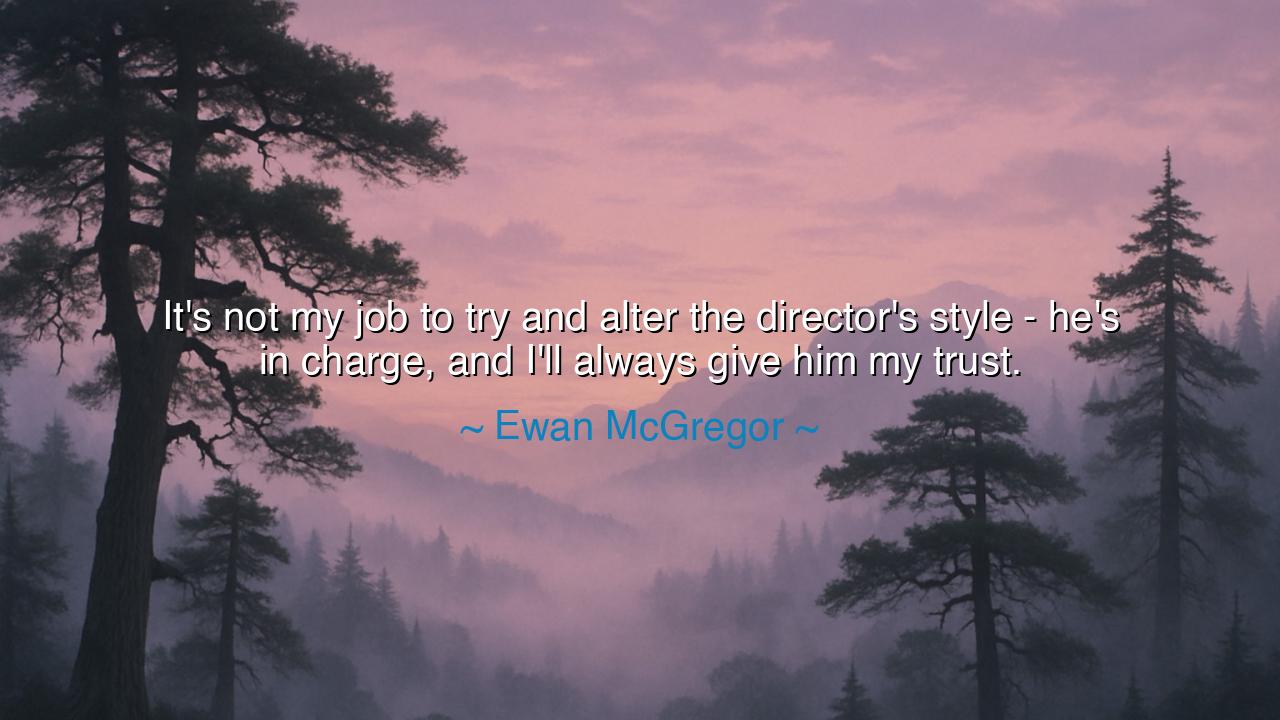
It's not my job to try and alter the director's style - he's in
It's not my job to try and alter the director's style - he's in charge, and I'll always give him my trust.






Hear the voice of Ewan McGregor, actor of renown, who declared with humility and discipline: “It’s not my job to try and alter the director’s style – he’s in charge, and I’ll always give him my trust.” These words, though born from the world of film and theater, hold within them a truth that reaches into every corner of life. For they speak of the sacred balance between leadership and service, between vision and execution, between command and obedience. In them lies the wisdom of unity: that one cannot build great works unless each part knows its role and honors it with trust.
The actor, by his craft, becomes many faces, many voices. Yet even so, he does not stand above the one who weaves the whole tale. The director is the keeper of the vision, the architect of the story, the guide who sees what the individual cannot. To try to alter his style is to divide the house; to resist his leadership is to weaken the work. McGregor, in saying he will give his trust, teaches us the humility of the craftsman who knows that greatness arises not from prideful independence, but from harmony within the larger whole.
The ancients themselves practiced this wisdom. In the armies of Rome, the legionary was a master of his sword, but he did not command himself; he trusted his general, who held the vision of the battle entire. If each soldier had chosen his own way, the legion would have scattered like sand before the wind. But by yielding to leadership, they became a force that conquered the world. So too in the arts: when each actor, each musician, each craftsman, trusts the conductor, the architect, the director—the whole becomes greater than the sum of its parts.
Consider the story of Laurence Olivier, titan of the stage. Though the greatest actor of his age, he too often placed his genius in the service of directors he respected. In doing so, he reached heights he could never have reached alone. His greatness was not diminished by submission—it was magnified. For true strength lies not only in mastery of one’s own gift, but in the ability to trust and join it to the vision of another. McGregor’s words echo this lesson: obedience, when offered freely, becomes an act of greatness.
And yet, trust is not blind. It is not slavery nor weakness. It is a conscious act of faith: “I yield my part to you because I believe in your vision.” This is no small thing. It requires courage to silence one’s ego, to resist the desire to shape all things according to one’s own will. But in this courage lies freedom, for the one who trusts is no longer burdened with carrying the whole. Instead, he may focus on perfecting his part, knowing that the larger design is in the hands of another.
The lesson for us is clear: in life, there are times when we must lead, and times when we must follow. Both roles are sacred. If you are the leader, lead with vision, humility, and care, for others place their trust in you. If you are the follower, serve with faith, discipline, and excellence, for by doing so you honor not only the leader but also the work itself. Do not grasp at control when it is not your place, nor shrink from obedience when the cause is worthy. In this balance, greatness is forged.
Therefore, remember McGregor’s wisdom: “It’s not my job to alter the director’s style – he’s in charge, and I’ll always give him my trust.” Carry this truth into your labors, your friendships, your families, your communities. Know when to step forward and when to yield. Give your trust not lightly, but once given, give it fully, with the strength of loyalty. For only when vision and service are joined together in harmony can any work—whether a film, a nation, or a life—shine with lasting greatness.






BCBao Chau
McGregor’s comment reflects a disciplined and team-oriented mindset, but it also makes me think about trust as a creative risk. When an actor fully commits to a director’s style, they’re essentially surrendering part of their own artistic control. How often does that trust pay off? And what happens when the director’s vision doesn’t align with the actor’s instincts or artistic sensibilities?
PANguyen phuong anh
I like McGregor’s take on respecting the director’s authority, but it raises questions about artistic ownership. If the director is in charge, does that mean the actor becomes more of an interpreter than a creator? How much individuality can an actor bring to a role without disrupting the overall vision? It seems like there’s a fine line between collaboration and control in filmmaking.
GBTruong Gia Bao
This perspective from McGregor shows a lot of humility and professionalism, but I’m curious about how it plays out in practice. What happens if an actor strongly disagrees with a director’s approach? Is blind trust always the right choice, or can it limit the actor’s contribution to the creative process? It’s fascinating to think about how much trust and compromise really shape a final performance.
HPNguyen Hanh Phuong
Ewan McGregor’s respect for a director’s vision highlights an interesting dynamic between collaboration and hierarchy in filmmaking. It makes me wonder, though, how much creative freedom an actor should have. Should actors simply follow direction, or can their instincts sometimes enhance the director’s vision? At what point does collaboration turn into overstepping, and how do professionals find that balance on set?